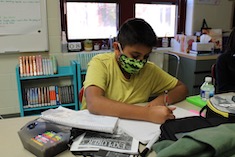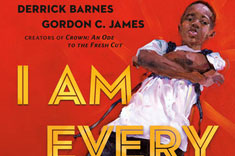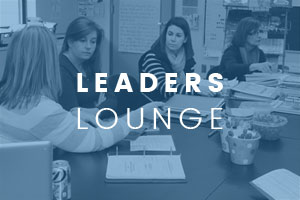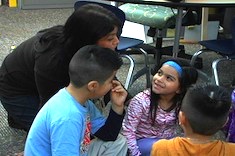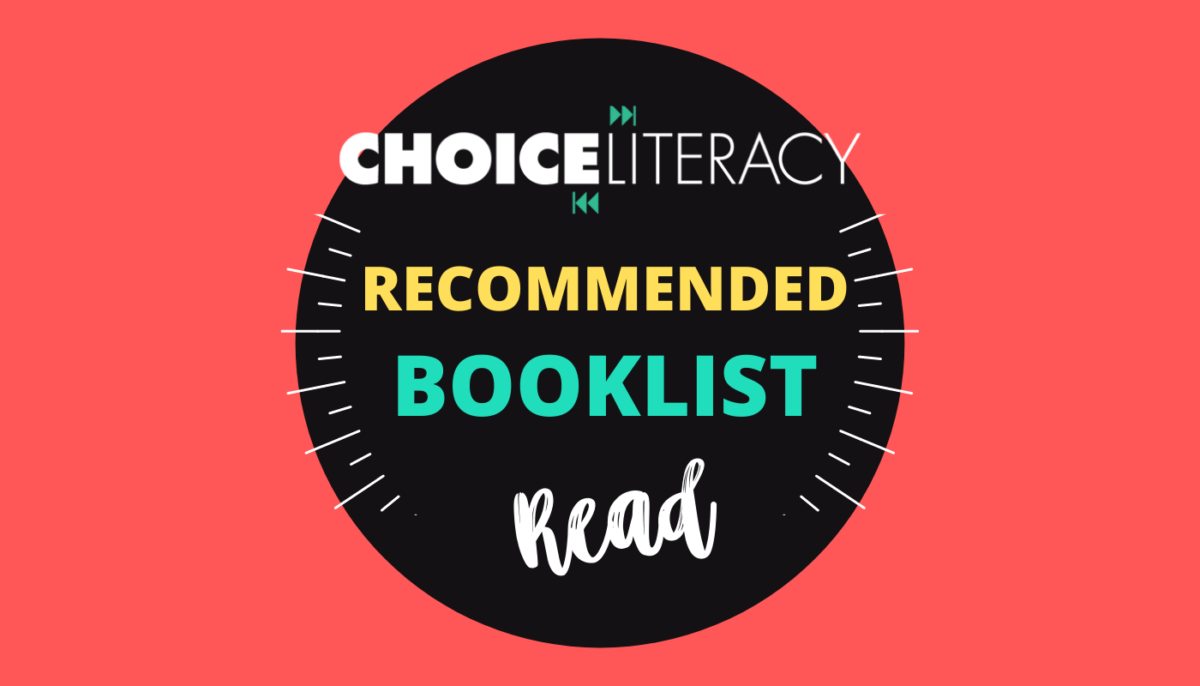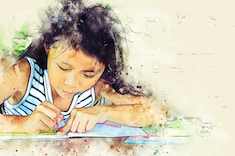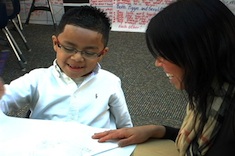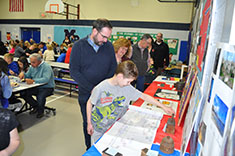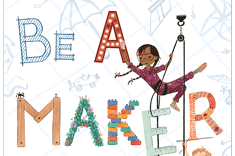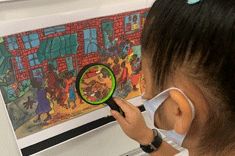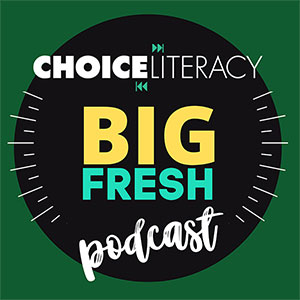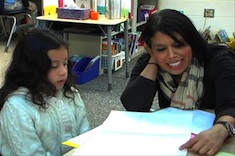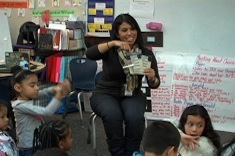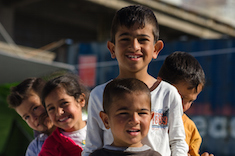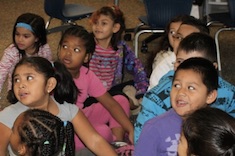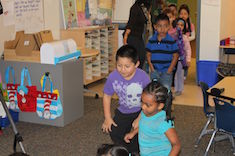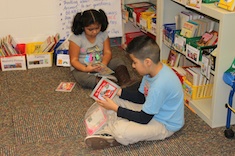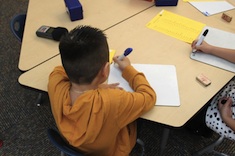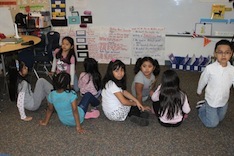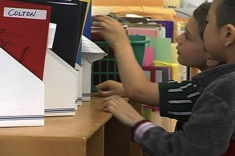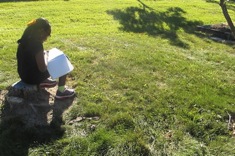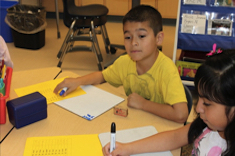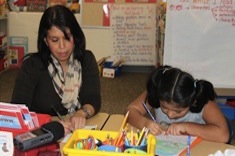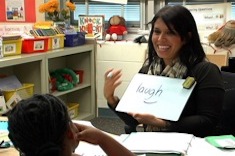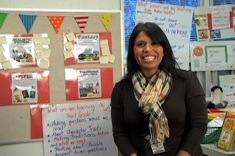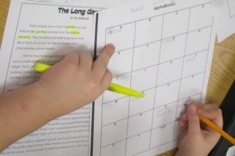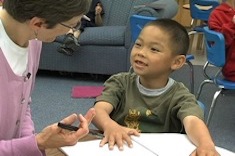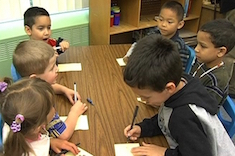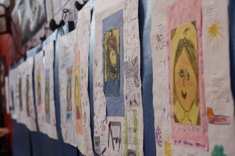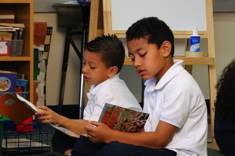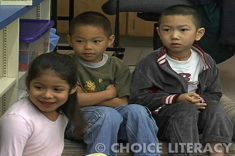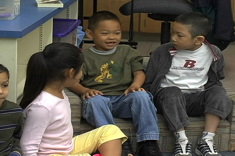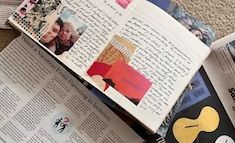Stella Villalba
Stella Villalba divides her everyday life teaching English language learners for one part of the day as she has been doing for 18 years. The other part of her day includes collaborating and coaching teachers across the Dublin, Ohio, school district, bridging understandings regarding teaching ELLs. Stella is a Lead Ambassador for NCTE. She is passionate about languages, literacy, and culture. You can keep up with Stella on Twitter @stellavillalba, Instagram @stellavillalba, or at her blog, Listening and Learning: A Teaching and Coaching Life.
All Content
The Art of Noticing: Have Your Students Played with Language Today?
Stella Villalba noticed her students were so busy writing quickly, they were not paying attention to crafting language. A student, Gabriela, turns to a book and asks for help to make her writing sound like the book. Stella uses this moment to slow down the class and create space to be inspired to write in beautiful ways.
Holding Space for Counter-Narratives That Honor Communities
Stella Villalba guides us to expand the counter-narrative texts we use in our classrooms. Counter-narrative texts challenge the stereotypes often seen about a group of people, and they celebrate the joy and resilience of a community. Stella provides a list of critical questions that allow us to deeply explore texts, as well as suggestions of books to read.
Crafting a Vision of Teaching and Learning Rooted in the Strength of Multilingual Learners (Part II)
In this second installment of a two-part series, Stella Villalba gives more examples of how to sustain a vision for teaching and learning that is rooted in the strength of multilingual learners. It is essential that we reflect on our practices to learn, unlearn, and rethink what is essential for students.
Crafting a Vision of Teaching and Learning Rooted in the Strength of Multilingual Learners (Part I)
Stella Villalba calls us all to action in leading a vision for teaching and learning that is rooted in the strength of multilingual learners. It is essential that we reflect on our practices to learn, unlearn, and rethink what is essential for students.
The Language Spoken at Home Is Always a Gift
Stella Villalba reminds us that the language spoken at home is a gift. She offers some ways to honor each student’s linguistic heritage.
Rethinking Parent-Teacher Conferences: Centering the Humanity of Students in All Discourses
Stella Villalba offers five compelling tips to making parent-teacher conference conversations more joyful, useful, and hopeful.
Questioning My Belief in the Need for Silence
Stella Villalba questioned her belief in the necessity of silent writing time when she began listening to students. In this thought-provoking article, Stella gives direction in how to meet the needs of all students—those who need time to talk and those who need a quiet writing space.
Centering Students’ Brilliance (Booklist)
Stella Villalba is passionate about centering the beauty, brilliance, and genius of all students in our classrooms. She shares an inclusive booklist to inspire and support other educators in doing the same.
Redesigning Experiences for Parent/Guardian Conferences
Stella Villalba questions the traditional practices of parent/guardian-teacher conferences. She offers a reflection and a call to action for everyone to consider the possibilities for more connection and equity during conference nights.
Classrooms as Spaces of Identity Development
Stella Villalba works with teachers to create classrooms that nurture and develop students’ identities. With this in mind, she leads teachers in building units that celebrate and affirm students while also meeting the expectations of standards. Included is a list of resources.
Investing in Our Collective Humanity: Nurturing an Intentional Cultural Life
Learning in communities, about communities, and from communities is the driving force behind Stella Villalba’s commitment to continually expand her knowledge of many cultures. In this article, Stella curates multimodal ways to expand your own experience and understanding.
Coaching in Community: Co-Creating Learning Spaces (Part I)
Stella Villalba suggests that we consider how to continue creating spaces where learning is co-created with a community. She encourages instructional leaders to share the ways they are learning (and unlearning) ideas for stronger literacy practices.
Understanding the Beautiful World of Being Multilingual Through the Lens of Brilliance and Complexity
Stella Villalba leads educators through a process to discover the brilliance and complexity of multilingual learners. Rather than searching for a list of strategies, Stella encourages us to linger with our questions and discover multilingual learners’ beauty.
Reclaiming What It Means to Flourish
Stella Villalba reclaims what it means for students to flourish by crafting a guidepost and action steps as a path to overcoming the deficit mentality that is too often part of conversations about learning.
Quick Take: Listen to Create a Sense of Belonging
Stella Villalba encourages all educators to listen to students to understand how to create a culture of belonging.
Professional Books that Make an Impact
Stella Villalba shares her top professional book recommendations. These titles will make an impact and widen your lens for meeting the needs of students.
Words of Reflection for New Coaches
Stella Villalba reflects on her journey as an instructional coach and offers advice to new coaches in a question-and-answer format.
Using Digital Photos to Enhance Learning
Stella Villalba uses photos in the classroom as a powerful tool for critical thinking and reflection. Photos allow students to process complex learning as it happens.
Critical Questions that Lead to Powerful Change
Stella Villalba begins with a powerful question for educators to consider in order to begin dismantling systems that oppress marginalized communities.
How the Influences of Reggio Emilia’s Teaching Approach Still Affect My Practice
Stella Villalba shares four values of Reggio Emilia that enhance literacy learning for multilingual students.
Creating a Community of Care: Beyond the Classroom Walls
Stella Villalba outlines three ways to cultivate a community for students beyond the classroom walls. There is comfort for teachers and students in knowing that a larger community is rooting for them.
Books to Fuel Creativity and Imagination
Stella Villalba shares books that will fuel your creativity and nourish your imagination.
Picture Books that Help Construct a Wider Definition of Home
Stella Villalba compiles a book list about the topic of home. She shares the way she allows students to co-construct their own understanding of home by using picture books that provide a variety of lenses through which to view the topic.
Everything I Need to Know About Teaching Children, I Learned Through Conferring
Stella Villalba pens a personal essay reflecting on her journey of learning to confer with students and reminds us of the importance of this practice.
Lead with Art, and Literacy Will Naturally Follow
Stella Villalba widens our perspective by sharing the link between art and literacy with suggested picture books to help build the bridge.
Using Art to Bridge Storytelling
Stella Villalba creates space for students to deeply notice the way artist Aminah Robinson uses images to share stories and testimonies.
May 28, 2021: Craft Moves for Writers
Craft Moves for Writers is the theme of this week’s newsletter.
Perspectives Podcast with Stella Villalba
Stella Villalba discusses the importance of perspectives.
Insight Before PD
Stella Villalba explains how professional development planning at a new site begins with lots of questions and observations.
Picture Books That Affirm and Celebrate Students’ Identities
Stella Villalba shares picture books to celebrate and affirm students’ identities.
Crafting Action Plans with Teachers
Stella Villalba shares her process for developing plans with teachers for intervening and for supporting individual students. Stella works with multilingual learners, and the principles are applicable to any child.
First-Grade Conference: Information Writing
Stella Villalba confers with Esmeralda about her information writing on blue jays.
Out of Sight, Out of Mind: Accountability for Young Writers
Stella Villalba teaches young writers about writer’s craft. So how come evidence of learning from the minilessons isn’t showing up when she confers with her students? She decides to develop a plan to help students link craft lessons with their writing.
Pausing for Renewal Throughout the Day
Stella Villalba shares three strategies teachers and literacy coaches can use to pause, re-center, and renew themselves throughout busy, stressful days in schools.
First Grade ELL Conference: Writing and Pop Culture
Stella Villalba confers with first grade English language learner Eric about his writing on angry birds, with Esmeralda also sharing advice.
From Observations to Questions
The starting point for assisting any teacher with a struggling learner is to observe and question. Stella Villalba shares her process, including what she focuses on in observations and how she uses what she sees as a springboard to conversations.
Newcomers and Read Aloud Time
Stella Villalba observes an English language learner who is new to a classroom being pulled from read aloud for extra support. She explains why read aloud is essential for all students, no matter what their language skills are.
Young Learners and Self-Talk
Do you have young readers and writers in your class who constantly talk to themselves? Stella Villalba helps a teacher decode the value of this self-talk for first grader Kayla, using it as a springboard for more learning.
Nice to Meet You Again
Stella Villalba shares why it is important to renew a teaching community by reconnecting periodically with everyone’s evolving goals and values.
Conferences with Parents of English Language Learners
Jen Schwanke and Stella Villalba share practical tips for conferring with parents of English language learners.
Building Cultural Awareness
Stella Villalba explains how frustrations with the families of English language learners can come from misunderstandings of cultural norms, and gives some tips for building awareness.
The Right to Be Seen
Stella Villalba is at a loss when a teacher is hostile to a new English language learner in her classroom. She considers the unspoken challenges of welcoming students who may never have been in school before.
Retelling and English Language Learners
Retelling is an essential skill many English language learners struggle with. Stella Villalba finds tackling vocabulary in context is the key for many.
Picture Book Biographies
Stella Villalba shares some of her favorite new picture book biographies for bringing history to life for young learners, with a focus on perseverance.
Guiding Questions to Stay Grounded
Conversations about needy students can be noisy, busy, and contentious. Stella Villalba finds that developing a few questions for reflection is a terrific way to stay grounded in basic principles and beliefs.
Recharging with My Tribe
Stella Villalba uses the inquiry and reflection skills she has developed as a teacher to pore through her planner and journal for clues to why her energy flagged in the winter and spring, and what she can do differently next year.
Refugees: A Children’s Booklist
There is probably no population more misunderstood or vilified than refugees. Stella Villalba shares a booklist to help young students understand the refugee's plight and experiences.
One Child, Many Stories
Asking the right questions of family members can get you far more valuable information than anything from an assessment, especially when you are dealing with English language learners. Stella Villalba explains why initial meetings with new families are crucial.
A Year of Learning About Student Refugees
Did you know the average length of stay in a refugee camp is 17 years? That’s only one of the many astonishing facts Stella Villalba learned as she worked to learn more about the needs of the refugees in her school district.
Fostering More Rereading in Classrooms
Stella Villalba explains why rereading is especially useful for young English language learners, and shares some simple strategies for integrating more rereading strategies into reading and writing workshops
Getting to Know English Language Learners All Year Long
We spend a lot of time early in the year getting to know students and their families, and often celebrate the diversity of these families late in the year with multicultural festivals. Stella Villalba worries that this is a missed opportunity (especially with English language learners). She shares how teachers can integrate getting-to-know-you activities into regular classroom routines all year long.
Coaching in Classrooms with English Language Learners
Many schools have seen an influx of English language learners recently. Coaches with little ELL experience may struggle to assist teachers with large ELL populations. Stella Villalba shares some tools and strategies for in-class coaching in classrooms with many English language learners.
Coaching Feedback and Reflection
Stella Villalba shares some simple strategies to foster more reflection and feedback with the teachers she coaches.
Rhyming Words and English Language Learners
Stella Villalba explains why focusing on rhyming words is crucial for young English language learners.
Environment and English Language Learners
Stella Villalba finds English language learners struggle less when teachers understand what adaptations are needed in the classroom environment.
Plans for Writing Circle
Stella Villalba starts writing workshop with her young English language learners by having everyone share their plans in a community circle.
Books That Mirror the Children in Our Classrooms
Stella Villalba shares some of her favorite children’s books that mirror the home cultures of English language learners.
Getting PD Feedback
Stella Villalba shares ideas for getting ongoing feedback after professional development offerings.
Modeling Nonfiction Writing for English Language Learners: Part 3
Stella Villaba models nonfiction writing for her first- and second-grade English language learners, and in the process integrates vocabulary instruction into her lesson. This is the final video in a three-part series.
Modeling Nonfiction Writing for English Language Learners: Part 2
Stella Villalba models nonfiction writing for her first- and second-grade English language learners, and in the process integrates vocabulary instruction into her lesson. This is the second video in a three-part series.
Modeling Nonfiction Writing for English Language Learners
Stella Villalba models nonfiction writing for her first- and second-grade English language learners, and in the process integrates vocabulary instruction into her lesson. This is the first video in a three-part series.
Learning Vocabulary in Context with English Language Learners
Stella Villalba explores why it is so important to teach vocabulary to English language learners in context.
Modifications for English Language Learners
Stella Villalba shares some modifications that can help English language learners demonstrate skills and knowledge.
Mid-Workshop Conversations
Stella Villalba finds mid-workshop conversations are a terrific routine to add to literacy workshops to promote growth, especially for English language learners.
My Journey with Marcos: Autism and English Language Learners
Stella Villalba finds she needs new strategies for assisting a young autistic English language learner.
I Don’t Want to Know What You Did Last Summer: Rethinking Narrative Nonfiction
Stella Villalba rethinks the seemingly innocuous “What did you do last summer?” writing assignment at the start of the year, especially for children who may have more limited experiences than peers.
Time for English Language Learners
Stella Villalba finds what English language learners need more than almost anything else is patience with silence and time to formulate responses.
What I Know for Sure: Reflection and Core Beliefs
Stella Villalba shares a reflection activity that centers her coaching and relationships with teachers and children.
English Language Learners First-Grade Guided Group
Stella Villalba leads a guided reading group of first-grade English language learners, beginning with building vocabulary.
Reframing Questions to Build a Reading Community
Stella Villalba and the second-grade teachers she coaches take a midyear look at the routines in place for building reading habits and conversations.
The Silent Period
Do you have English language learners in the silent period in your school? Stella Villalba has tips for teachers working with them.
A Classroom for Elementary English Language Learners
Stella Villalba gives a tour of her classroom library and publishing corner designed to support the grades 1-5 English language learners she works with daily.
Habits That Maximize Time
Stella Villalba writes about the importance early in the year of building habits with students that maximize time for English language learners.
Connecting Nonfiction Reading and Writing: Conferring with Hermione
Stella Villalba confers with Hermione, a first grader who is also an English language learner. Hermione is combining research and writing as she writes a nonfiction report.
Nonfiction and English Language Learners
Stella Villalba has advice about connecting nonfiction, young English language learners, and the Common Core.
Rehearsing Informational Writing: Conferring with Jocelyn
Stella Villalba confers with first grader Jocelyn about the information text she is writing about bunnies. Jocelyn is an English language learner, and this conference demonstrates the value of oral rehearsal for young ELL writers.
Integrating Vocabulary and Retelling Strategies into Read-Aloud
Stella Villalba scaffolds the language development of her first- and second-grade English language learners during read-aloud by highlighting vocabulary and providing a tool to assist with a partner retelling activity.
Hearing Carlos: Helping Young English Language Learners Develop Speaking and Listening Skills
Stella Villalba incorporates more speaking and listening activities into her primary classroom for English language learners.
Without Answers
English language learners may have some of the quietest voices in schools. In this poem and narrative, Stella Villalba shares the power of finding ways to bring those voices out in your classroom.
Are Your Writers Talking During Writing Workshop?
Stella Villalba shares practical tips for helping young English language learners collaborate with classmates and receive feedback during writing workshop.
A Poetry Cafe Celebration
Stella Villalba explains how her poetry cafe program brings families together for a festive event, and helps English language learners develop reading and fluency skills at the same time. This is the first installment in a two-part series.
An ESL Poetry Cafe Celebration (Part II)
Stella Villalba explains how her Poetry Cafe program brings families together for a festive event, and helps English language learners develop reading and fluency skills at the same time. This is the second installment in a two-part series.
Raising Readers: Independent Reading, Choices, and Intentional Reading Practices
How can teachers promote good independent reading choices for English language learners? Stella Villalba has suggestions.
Getting to Know Multilingual Learners at the Start of the Year
If you’re unsure about working with multilingual learners, Stella Villalba has some reassuring advice for you.
Books and Activities from Around the World to Celebrate the Holiday Season
People around the world celebrate the holidays in different ways, and that diversity provides wonderful learning opportunities this time of year. Stella Villalba shares literary holiday projects and a booklist around the themes of “peace” and “wishes” that might help students find common ground in family traditions.
Bilingual (English/Spanish) Books that Celebrate Language, Family and Culture
Stella Villalba shares her favorite bilingual (English/Spanish) books for helping young English language learners feel at home in new classrooms early in the year.
Jose the Late Bloomer
Stella Villalba has practical advice for reaching a young English language learner who is reluctant to write and often frustrated.
Photo Booth and Young Readers
Stella Villalba uses the Photo Booth app to build stamina in a young English language learner, as well as reinforce the learning and practice at home.
Writing as an Act of Resistance and a Source of Strength
In this beautiful personal essay, Stella Villalba reminds us that writing is a source of strength, and developing a community of writers is essential in post-pandemic classrooms.
Books That Sustain the Linguistic Lives of Multilingual Learners
We need more bilingual books! Stella Villalba explains why these books are essential and provides a booklist to help sustain the linguistic lives of multilingual learners.
Pedagogical Clarity in a Time of Changes
Stella Villalba encourages us to reflect on our core beliefs about teaching. She offers a list of reflection questions to encourage brave and meaningful consideration.
Integrating Vocabulary and Retelling Strategies into Read-Aloud
Stella Villalba scaffolds the language development of her first- and second-grade English language learners during read-aloud by highlighting vocabulary and providing a tool to assist with a partner retelling activity.
English Language Learners First-Grade Guided Group
Stella Villalba leads a guided reading group of first-grade English language learners, beginning with building vocabulary.
Cultivating a Habit of Reading Children’s Literature as Part of Our Professional Growth
Stella Villalba is committed to having teachers share picture books during professional development sessions to deepen their reading identities and enhance their choices of picture books to use in their classrooms.
Coaching in Community: Co-Creating Learning Spaces (Part II)
Stella Villalba suggests that we consider how to continue creating spaces where learning is co-created with a community. In this second installment, she offers questions for reflective practice and practical ways to amplify teachers’ brilliance.
Instructional Routines That Promote Agency for Multilingual Learners
Cultivating agency is a matter of building small, intentional moves that ask students to be part of the learning process. Stella Villalba offers three ways educators can support the growth of multilingual learners in all learning spaces.

